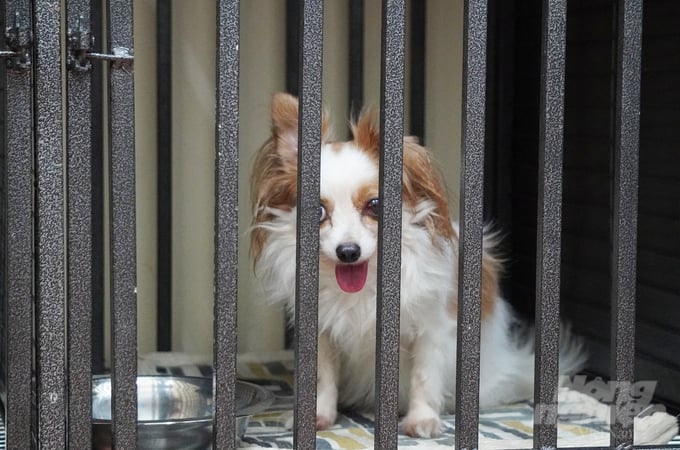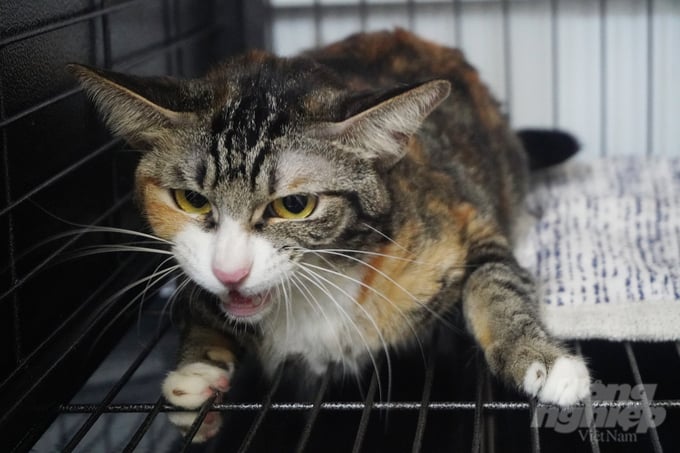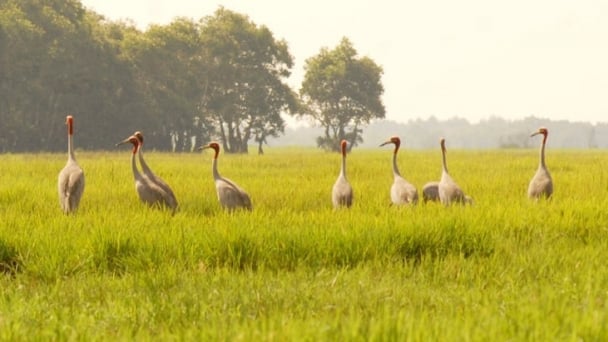August 1, 2025 | 09:17 GMT +7
August 1, 2025 | 09:17 GMT +7
Hotline: 0913.378.918
August 1, 2025 | 09:17 GMT +7
Hotline: 0913.378.918

Microchipping facilitates management and access to information regarding pet ownership, vaccination history, and breed. Photo: Nguyen Thuy.
According to the Ho Chi Minh city's Sub-Department of Livestock Production and Animal Health under the Department of Agriculture and Rural Development, the city currently houses over 184,000 dogs and cats. Notably, over 34% of these animals are raised in the suburban districts of Cu Chi, Hoc Mon, Binh Chanh, Nha Be, and Can Gio. Among these animals, there are over 29,000 crossbred dogs, accounting for 15.8% of the total population; over 26,000 foreign breed dogs, accounting for 14.26% of the total population; and over 121,000 native breed dogs, accounting for 66.19% of the total population.
Within the last few months, Ho Chi Minh city reported an increase in incidents involving dogs, which range from noise disturbances, environmental pollution, compromised public hygiene, to canine attacks on human and traffic accidents. Furthermore, pet dogs have been identified as potential vectors for transmitting diseases from animals to humans, including rabies.
According to the healthcare sector, a considerable number of residents in Ho Chi Minh city require vaccinations as a result of dog and cat bites every year. Consequently, the city suffers significant economic losses due to the costs of vaccination and preventive treatment.
Moreover, Ho Chi Minh city has seen a noticeable increase in multiple-dog households, resulting in prevasive odors, noise disturbances, and adisruptions to the daily lives of neighboring residents. Despite repeated complaints, conclusive remedies are constrained by limitations in the regulatory framework.
On the other hand, the application of the current regulatory framework faces difficulties in terms of management and enforcement, primarily due to a lack of specific and detailed regulations regarding pet ownership. This limitation is particularly evident in cases involving multiple-dog households.
In addition, there is a noticeable lack of regulations pertaining to the criteria for establishments engaged in the trade of ornamental animals, as well as guidelines regarding the confinement of dogs within veterinary clinics to ensure humane treatment and a clean environment during the breeding process.
In response to this challenge, Ho Chi Minh city's Department of Agriculture and Rural Development submitted a proposal to the Ho Chi Minh City People's Committee on February 27, requesting approval to develop temporary regulations on the management of dog and cat ownership in the city. These regulations aim to delineate the responsibilities of pet owners in the city. Additionally, they advocate for the widespread adoption of microchipping among pet-owning households to facilitate the management of individual-level information pertaining to dogs and cats, including breeding, vaccination, and veterinary quarantine during transportation.

Mr. Nguyen Van Dung, Head of the Department of Livestock Epidemiology under the Ho Chi Minh city's Department of Livestock Production and Animal Health. Photo: Nguyen Thuy.
During a press conference on the state of socio-economic development held on the afternoon of April 25, Mr. Nguyen Van Dung, Head of the Department of Livestock Epidemiology under the Ho Chi Minh city's Department of Livestock Production and Animal Health, stated that if the temporary regulations on on the management of dog and cat ownership in the city are approved by the People's Committee, the Sub-Department of Livestock Production and Animal Health will provide consultation to the Department of Agriculture and Rural Development on the pilot implementation of these regulations in several designated areas within the inner city.
Subsequently, the Sub-Department will conduct an assessment on the effectiveness of the regulations, and encourage pet owners within the city to microchip their pets, with an emphasis on valuable ornamental dogs and cats.
"Microchipping will facilitate management and access to relevant information such as pet ownership, breed, and vaccination and transportation history. The data will then be updated in the state management agency's database," Mr. Dung added.
Registering pet ownership with local governments will enable precise monitoring of the total population of dogs and cats in the area. This initiative will be supplemented by the comprehensive registration and declaration of pet ownership with local governments.

Comprehensive registration and declaration of pet ownership with local governments facilitate the formulation of disease monitoring and vaccination plans. Photo: Nguyen Thuy.
"The regulations will serve as the basis for implementing pet ownership management, and disease prevention and surveillance measures such as effectively allocating vaccine and resources to meet practical needs, thereby contributing to maintaining Ho Chi Minh City's position as a rabies-free area as well as protecting public health.
If local residents fail to register and declare their pet ownership with the local governments, the data on the total population of dogs and cats in the city will not be accurately updated. Consequently, this will affect the formulation of disease surveillance plans and rabies vaccination efforts," Mr. Dung emphasized.
According to the temporary regulations, Ho Chi Minh city's Department of Livestock Production and Animal Health recommends local residents to limit the breeding of large and aggressive dog breeds such as the American Pit Bull, Spanish Perro de Presa Canarios, Argentinian Dogo Argentinos, Japanese Tosa, Brazilian Fila Brasileiros, among many others. These regulations also stipulate requirements for environmental management and noise control in dog and cat breeding.
A fine of 1-2 million dong for leaving unvaccinated dogs unattended
Regarding the level of administrative penalties for leaving dogs and cats unattended, Mr. Nguyen Van Dung stated that according to Decree No. 90/2017/ND-CP as amended by Decree No. 04/2020/ND-CP, individuals leaving dogs unattended without a muzzle or leash in public spaces will be subject to a fine of 1 to 2 million Vietnamese dong. In addition, individuals leaving dogs without rabies vaccination unattended will be subject to a fine of 1 to 2 million Vietnamese dong.
"I believe that this is a reasonable penalty level. In practice, the majority of dog owners who leave their pets unattended have the financial ability to pay this fine," Mr. Nguyen Van Dung said.
Furthermore, owners of unattended dogs that bite people and cause injuries will be held responsible and must bear all related expenses. In cases of severe injuries, they may also be subject to legal proceedings according to statutory regulations.
With regards to the issue of unattended dogs in public spaces without muzzles or leashes, Mr. Dung added that the city is continuing to implement training and awareness campaigns for pet owners regarding compliance with pet ownership regulations.
Translated by Nguyen Hai Long

(VAN) Tram Chim National Park is striving to restore its natural habitat in hopes of bringing back the red-crowned cranes and establishing a breeding population in the Dong Thap Muoi.
![Golden sea, sustainable vision: [2] Revitalizing fisheries, reducing IUU violations](https://t.ex-cdn.com/nongnghiepmoitruong.vn/608w/files/chinq/2025/07/30/4659-dsc04845-134645_15.jpg)
(VAN) The Tan Thuan fishing community task force provided 126 valuable leads to functional agencies, helping to prevent and penalize 65 violations.

(VAN) The International Organization for Migration (IOM) has reaffirmed its commitment to continue providing technical assistance, policy advice, and capacity building based on the priorities proposed by the Vietnamese side.
![Golden sea, sustainable vision: [1] The concerns of veteran fishermen in coastal areas](https://t.ex-cdn.com/nongnghiepmoitruong.vn/608w/files/content/2025/07/30/bien-ham-thuan-nam-lam-dong-binh-thuan-130242_21-083526.jpeg)
(VAN) For the hundreds of fishermen in Tan Thanh commune, restoring marine resources serves as a guiding principle that drives their direct involvement in protecting the sea alongside local authorities.

(VAN) The ecotourism development project in protection forests opens up opportunities to boost the economy in tandem with forest conservation, laying the foundation for sustainable development in Quang Ninh.
![Wood processing for export under EUDR: [3] Adaptive solutions](https://t.ex-cdn.com/nongnghiepmoitruong.vn/608w/files/huyenvt (e)/2025/07/28/5937-1-194314_293.jpg)
(VAN) To resolve bottlenecks and remove difficulties for the exported wood processing industry, the People's Committee of Gia Lai Province has implemented solutions to adapt to EUDR regulations.

(VAN) The Carbon Park initiative aims to establish a model that links green-transitioning businesses, contributing to a transparent and sustainable pathway toward carbon neutrality.